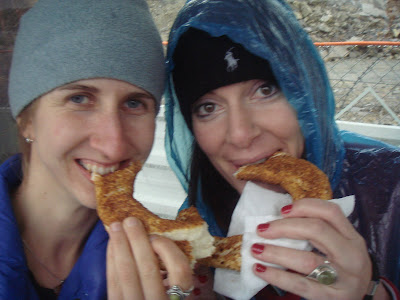





This past weekend, eight of us BUPS teachers headed to Istanbul on the overnight train for the 30th INTERCONTINENTAL ISTANBUL EURASIA MARATHON. Two of my friends ran the marathon, three ran the 15km run, and the last three (including me) walked the 6km "fun run." All the races started on the Asian side, crossed the Bosporus Bridge and finished on the European side. Unfortunately, due to the massive rainstorm that was not in the forecast which started Saturday night and did not let up for 24 hours, the "fun runners" were unable to finish the race. Cold, wet, nearing hypothermia, these three troopers were forced after crossing the arduous Bosporus Bridge to hail a taxi to a friend's house where they recovered by watching movies, taking naps, and ordering in Chinese Food while staring out the window at the rain, thinking of their friends, Pierre and David, who were "still running."

Their friends who were able to run and generate enough body heat to finish their races did exceedingly well, and we're very proud of them.




The overnight train to Istanbul was an adventure in and of itself. My first experience sleeping in a sleeper car! The train leaves Ankara at 10:30pm Friday night and arrives Sat. morning at 8am. Normally, the trip would take between 4 and 5 hours to drive, but this overnight train makes tons of stops in order to arrive at a reasonable time in Istanbul. The train was complete with folding-down bunks and a drink car.




When we arrived in Istanbul, we took the ferry across to the European side for breakfast and to our pensyon. The early morning light was beautiful! I love the water in and around this city. It is especially refreshing compared to the lack thereof in Ankara.





On Saturday, I put a dent in figuring out the public transport system of Istanbul and found my way to the Salvador Dali exhibit at the Sakip Sabaci Museum, the largest collection of Dali artwork outside of Spain. This man really dabbled in all the media. The exhibit included a film he created for Disney which consisted of all his crazy images moving and interacting (it's called Destiny in case you want to check it out), the set he created for Hitchcock's Spellbound which was cool because my students are studying Hitchcock in our Film Studies class, and some weird black and white surrealist silent films. There were also many illustrations he did for books such as Milton's Paradise Lost, paintings which he created before ever reading the story, images he conjured up in a dream. There was also a recreation of his "theatre of figures": a room full of images/creatures from his paintings, blown up onto huge posterboard and hung around the room to create the atmosphere of one of his surrealist dreams.

Istanbul was in quite the flooded state by the time we took off on our bus at 7pm Sunday night. Reading the paper the next day, we learned the marathon and the rain paralyzed parts of the city.


We arrived back in Ankara after midnight, crashed in bed and woke up early the next morning for school. Istanbul is a fun getaway but is certainly not of the "R-and-R" type.








































